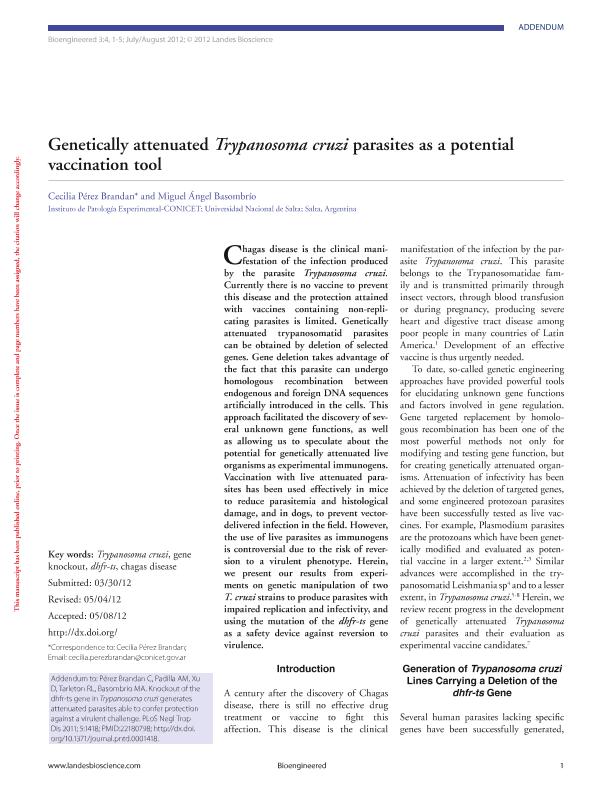Artículo
Genetically attenuated Trypanosoma cruzi parasites as a potential vaccination tool
Fecha de publicación:
18/06/2012
Editorial:
Taylor & Francis
Revista:
Bioengineered
ISSN:
1949-1018
Idioma:
Inglés
Tipo de recurso:
Artículo publicado
Clasificación temática:
Resumen
Chagas disease is the clinical manifestation of the infection produced by the parasite Trypanosoma cruzi. Currently there is no vaccine to prevent this disease and the protection attained with vaccines containing non-replicating parasites is limited. Genetically attenuated trypanosomatid parasites can be obtained by deletion of selected genes. Gene deletion takes advantage of the fact that this parasite can undergo homologous recombination between endogenous and foreign DNA sequences artificially introduced in the cells. This approach facilitated the discovery of several unknown gene functions, as well as allowing us to speculate about the potential for genetically attenuated live organisms as experimental immunogens. Vaccination with live attenuated parasites has been used effectively in mice to reduce parasitemia and histological damage, and in dogs, to prevent vector-delivered infection in the field. However, the use of live parasites as immunogens is controversial due to the risk of reversion to a virulent phenotype. Herein, we present our results from experiments on genetic manipulation of two T. cruzi strains to produce parasites with impaired replication and infectivity, and using the mutation of the dhfr-ts gene as a safety device against reversion to virulence.
Palabras clave:
Trypanosoma Cruzi
,
Gene Knockout
,
Vaccine
,
Chagas Disease
,
Dhfr-Ts
Archivos asociados
Licencia
Identificadores
Colecciones
Articulos(IPE)
Articulos de INST.DE PATOLOGIA EXPERIMENTAL
Articulos de INST.DE PATOLOGIA EXPERIMENTAL
Citación
Pérez Brandan, Cecilia María; Basombrio, Miguel Ángel Manuel; Genetically attenuated Trypanosoma cruzi parasites as a potential vaccination tool; Taylor & Francis; Bioengineered; 3; 4; 18-6-2012; 1-5
Compartir
Altmétricas




